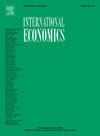Global production scenarios: Actual unbundling, potential rebundling and geoeconomic rewiring across value chains
引用次数: 0
Abstract
We analyze the cross-country distributional effects of global production reconfiguration by means of two multisectoral accounting exercises. First, we simulate counterfactuals that decouple input structures from final demand composition, showing that it is not trade integration per se that determines value-added outcomes, but the fit between production architectures and final demand geography. Second, we model three geoeconomic fragmentation scenarios – involving unilateral provocation and retaliatory decoupling – based on bloc-specific trade restrictions among US-led, China-led and Non-Aligned country blocs. Results reveal asymmetric impacts: large, globally embedded economies face significant losses, while gains concentrate in geoeconomically aligned or flexibly positioned economies. Sectoral outcomes vary with value-chain positioning. The paper provides a global multisectoral accounting perspective to analyses of supply chain disruptions, emphasizing that the same inter-country input trade interdependence that once brought efficiency gains may now act as a constraint in shaping resilience under trade realignment.
全球生产情景:跨价值链的实际拆分、潜在重新捆绑和地缘经济重新布线
我们通过两个多部门的会计练习来分析全球生产重组的跨国分配效应。首先,我们模拟了将输入结构与最终需求组成分离的反事实,表明决定增值结果的不是贸易整合本身,而是生产架构与最终需求地理之间的契合。其次,我们基于美国领导的、中国领导的和不结盟国家集团之间特定的贸易限制,模拟了三种地缘经济分裂情景——包括单边挑衅和报复性脱钩。研究结果揭示了不对称影响:全球一体化的大型经济体面临重大损失,而收益集中在地缘经济结盟或定位灵活的经济体。各行业的结果因价值链定位而异。本文为供应链中断分析提供了全球多部门会计视角,强调曾经带来效率提高的国家间投入贸易相互依赖,现在可能成为贸易调整下形成韧性的制约因素。
本文章由计算机程序翻译,如有差异,请以英文原文为准。
求助全文
约1分钟内获得全文
求助全文
来源期刊

International Economics
Economics, Econometrics and Finance-Economics, Econometrics and Finance (all)
CiteScore
6.30
自引率
0.00%
发文量
74
审稿时长
71 days
 求助内容:
求助内容: 应助结果提醒方式:
应助结果提醒方式:


